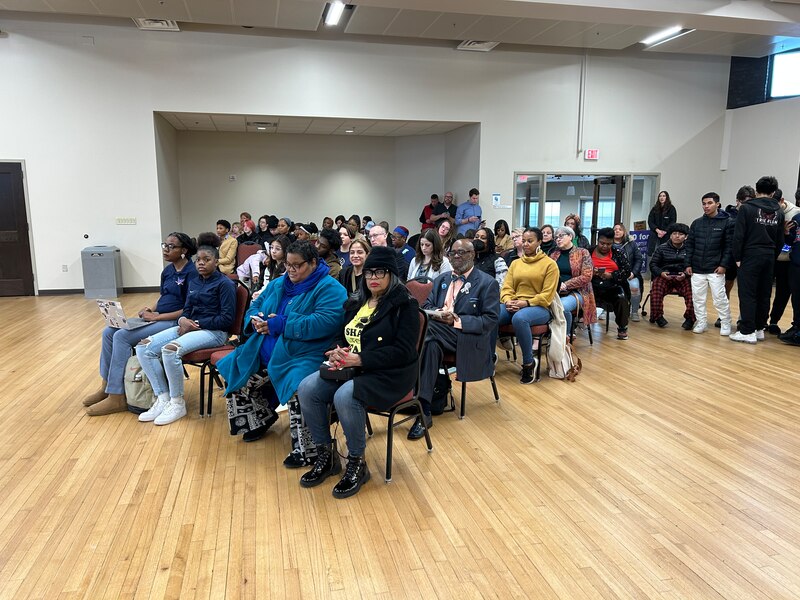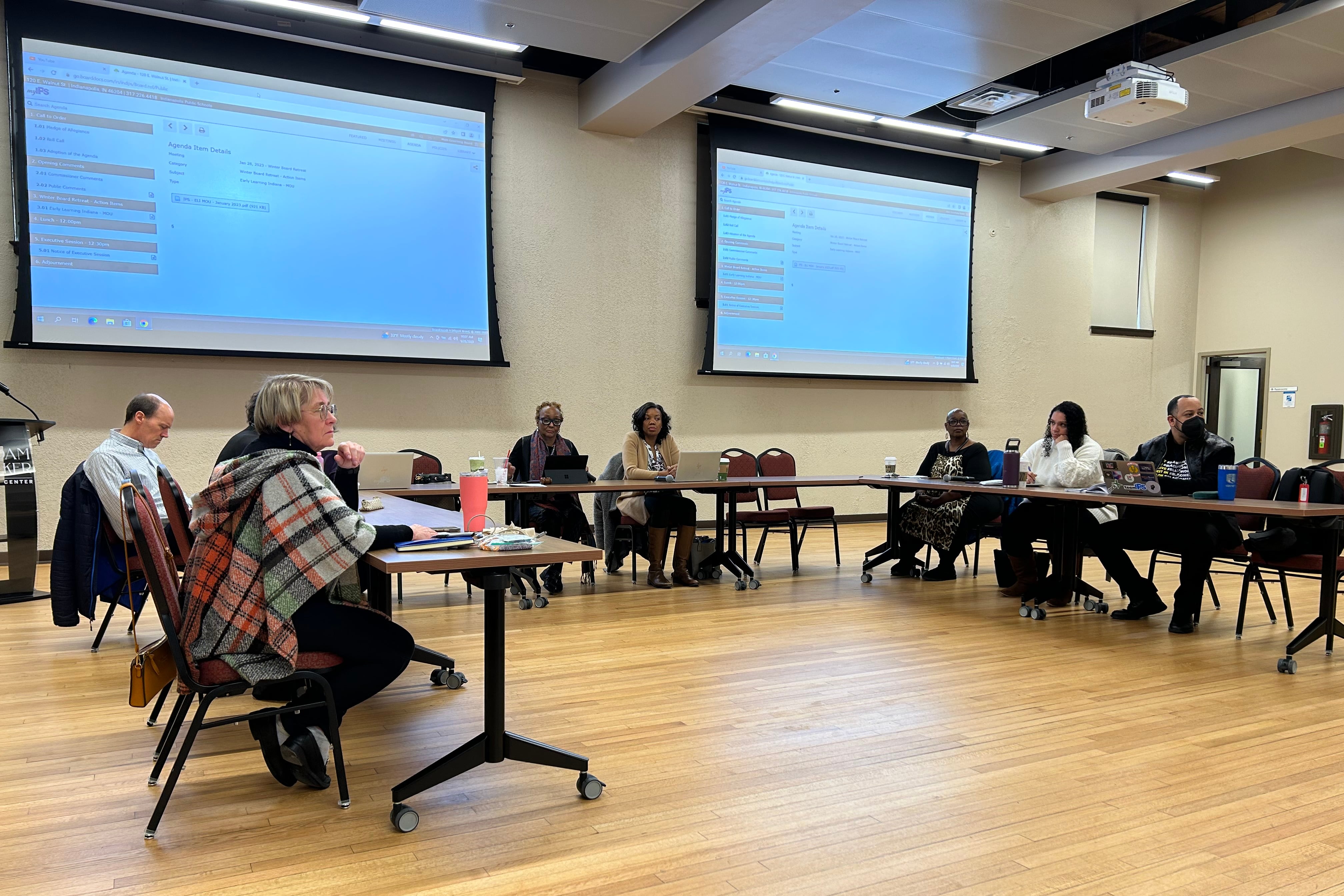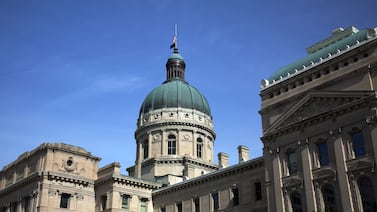Indianapolis Public Schools will delay its plan to place a $413.6 million referendum for operating expenses on the May ballot after mounting public pressure to give more funding to charter schools and the recently announced lack of support from the influential Indy Chamber.
The school board needed to approve the referendum by Feb. 17 to have it on the ballot in May, and that’s now unlikely to happen, board members said at Saturday’s school board meeting. The district planned to use the operating referendum to fund its vast revitalization effort, known as Rebuilding Stronger, so the delay was a blow to those plans.
The change, however, came with the most comprehensive public comments yet on the matter from IPS Superintendent Aleesia Johnson, who in a nearly 10-minute speech expressed concern that organizations within the city’s educational landscape have sown discord at the expense of its students.
“Right now in Indianapolis we have lost sight of the concept of a village, when organizations can publicly declare that they cannot support funding for well documented and much overdue improvements needed for our children’s schools, and question if they really need that expanded access to algebra and music,” she said at the school board meeting. “That is concerning.”
A second ballot question, one to raise $410 million for capital expenses, is still moving forward and will be on the ballot for voters to decide in May.
The district must now assess which parts of Rebuilding Stronger it can still implement without the operating referendum funding, IPS board president Venita Moore said after the meeting.
Delaying the operating referendum came with voiced frustration from both Johnson and board members after weeks of pushback from influential groups within the educational ecosystem, including Stand for Children Indiana, the Mind Trust, and RISE Indy — organizations that are supportive of charter schools. Those same organizations issued statements praising the delay after it was announced, but not addressing Johnson’s concerns.
IPS board member Diane Arnold noted her disappointment with individuals she later clarified as these groups, arguing that the fight for charters to receive more funding devolved into accusations.
The fight for more funding had become in recent weeks focused on race and equity, as parents and students packed board meetings and argued that charter schools have high proportions of students of color. While IPS has agreed to share its funds with charters within its Innovation Network, it has declined to share with independent charters over concerns of oversight.
“I’m disappointed that individuals I had previously respected resorting to accusing myself and other commissioners of caring more for white students than students of color — that narrative that was fueled and repeated by specific organizations to support their agenda,” said Arnold, the longest serving member on the board.
The two proposed ballot measures were meant to help the district upgrade crumbling buildings, consolidate campuses, and expand academics — particularly for students of color — as it downsizes and also competes with charter schools for students. The operating measure would have also maintained competitive salaries amid an acute shortage of teachers and other school workers.
District officials have long projected that IPS will reach a fiscal cliff by the end of 2026, when both federal COVID relief funds and the current operating referendum will have expired.
IPS estimated that the two proposals together would have raised taxes by about $6 per month for the owner of a home assessed at $138,500, the estimated median value of homes in the district.

Charters, business interests oppose the referendum
Pushback from the charter sector continued on Saturday as over 50 people packed the Madam Walker Legacy Center for the board meeting. Some carried signs reading “$0 for charter students is not fair” and “Delay the vote.”
Charter schools will largely be unaffected by the changes outlined in the district’s Rebuilding Stronger effort and will not be adopting the policies and the specialized academic offerings outlined in the plan, such as Montessori or dual-language programs.
On Saturday, Moore said the board was prepared to share equally with its Innovation Network charters based on the needs of each school’s population — a higher amount than the district’s last offer, which stood at a little over $1,000 per Innovation student, compared to roughly $1,900 for each traditional IPS student.
“Unfortunately we still could not make or reach a decision that it was something that could be supported,” she said. “Again I also want to say that I am very disappointed with that decision.”
Superintendent Aleesia Johnson outlines concerns of divide
In her comments, Johnson argued that the district’s current setup creates a divide.
The city’s charter sector has grown year after year as the district has slowly lost enrollment, forced to stretch resources more thinly across the board and close underutilized buildings. While IPS has embraced some of these schools as part of its own within its Innovation Network, others have no ties to the district.
“The reality is that we have created an educational system and landscape in this city that goes against the idea of the village — it is every person for themselves,” she said. “It is, ‘how do I make sure my school gets the resources?’ It is, ‘I only need to be accountable to the people I directly serve.’”
Johnson’s remarks also nodded to the many groups and organizations involved in the educational landscape in the city, arguing that some within the community intentionally sow discord. She did not name any specific groups.
“There are those in our community who are incentivized by cultivating dissension to position one group of people against another— who are incentivized by schools failing kids because it helps to prove their point, be it a charter school that closes in January or a district school that is restarted,” she said.
Brandon Brown, CEO of the Mind Trust nonprofit that helps start charter schools in Indianapolis, and Stand for Children Indiana, which has rallied charter parents to speak at meetings for weeks, said in separate statements that they applauded the district’s decision to delay the vote. The statements didn’t comment on the concerns of divisiveness outlined by the superintendent.
In a statement, RISE Indy president and CEO Jasmin Shaheed-Young also thanked the district for the delay.
“There have been some tense moments, and I want to recognize that these conversations aren’t easy, especially when we are talking about money,” she said, also noting that Arnold is an “incredible asset” that RISE looks forward to working with.
Arnold also argued that the funding fix could instead be taken up by the state legislature.
“I don’t dispute there are funding disparities,” she said. “However, we did not create that disparity. If our state legislature can find money to expand vouchers for private schools, perhaps they could also better support public charters as well.”
Capital referendum to fund facilities
IPS has just over three months to convince voters to approve the capital referendum before the primary election on May 2.
The $410 million capital referendum would fund improvements and new construction at 23 school campuses.
A 2020 analysis of building conditions found that about 21% of the district’s buildings were in poor or worse condition. It would take about $466 million to bring all district buildings to a condition of good or better.
The ballot measure would increase property tax rates by up to about 21 cents per $100 of assessed value.
Amelia Pak-Harvey covers Indianapolis and Marion County schools for Chalkbeat Indiana. Contact Amelia at apak-harvey@chalkbeat.org.





